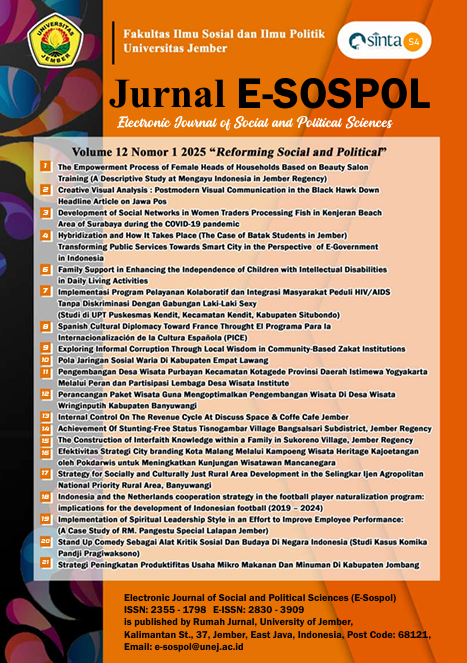Stand Up Comedy sebagai Alat Kritik Sosial dan Budaya di Negara Indonesia
Studi Kasus Komika Pandji Pragiwaksono
DOI:
https://doi.org/10.19184/e-sospol.v12i1.53725Abstract
This study investigates the role of stand-up comedy as a medium for social and cultural critique in Indonesia, using comedian Pandji Pragiwaksono as a case study. In the post-Reform era, when freedom of expression is constitutionally protected, public critique serves as a check on policy and social norms. Drawing on Sigmund Freud’s theory of humor, the research focuses on comedic mechanisms absurd analogies, sarcasm, and pop-culture references that convey critical commentary without provoking excessive resistance. A qualitative content analysis was conducted on five of Pandji’s YouTube performances from 2018 to 2023, selected for view counts and thematic relevance: legalization of prostitution, political image-making, and national unity. Each segment was coded by theme and analyzed to reveal how humor exposes social contradictions, prompts audience reflection, and facilitates public dialogue. Data validity was reinforced through triangulation of audience responses, including laughter, online comments, and spontaneous live interactions. Findings show that Pandji effectively reframes sensitive topics, using the “urgency to defecate” analogy to discuss prostitution legislation and satirizing a “nation of image-makers” in contemporary politics. His use of sarcasm and wordplay creates a “safe space” for audiences to reevaluate societal values and practices. Stand-up comedy thus emerges as a powerful tool that combines entertainment with critical awareness.
Downloads
Downloads
Published
Issue
Section
License
Penulis yang mengusulkan naskahnya untuk dapat diproses penerbitannya pada e-SOSPOL dianggap telah menyetujui beberapa hal sebagai berikut:
1. Penulis tidak dapat menarik naskah yang telah usulkan untuk diproses hingga mendapat jawaban dari Ketua Dewan Penyunting atas status naskah artikel ilmiahnya (diterima atau ditolak untuk diterbitkan).
2. Penerbit tidak bertanggung jawab terhadap kasus plagiasi atas artikel yang terbit pada e-SOSPOL
3. Penerbit tidak bertanggung jawab atas data dan isi dari artikel yang diterbitkan pada e-SOSPOL, dan sepenuhnya merupakan tanggung jawab penulis.







